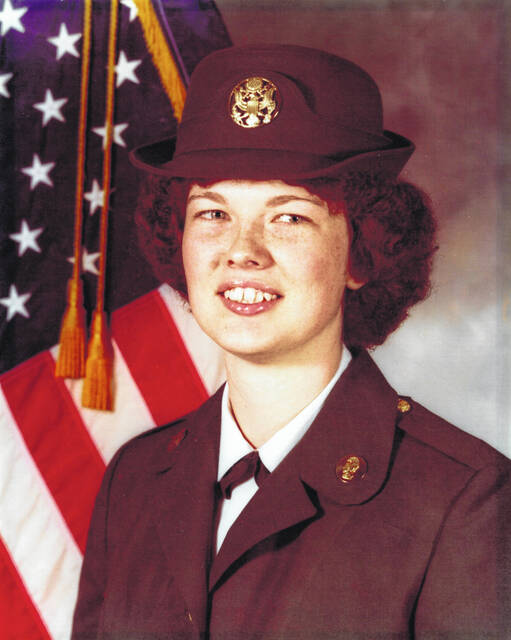

Henderson
Provided photo
By Vivian Blevins
Contributing Columnist
A recent report indicates that the rate of sexual assault in the military is up. Many girls and women who are raped refuse to openly speak about it because they realize that the repercussions can be as deadly as the assault itself: “She was asking for it” or “She should have known better than to wear that outfit” or “I’ve always known she was trashy, and this just proves it.”
A 1976 graduate of Arcanum High School, Deborah Henderson, joined the U.S. Army in 1977. She says that she had received a call from a grade school friend who was joining and began to feel, “There is something more to life than this little dinky town of Arcanum.” She completed both her basic training and special training at Fort Jackson in South Carolina and then travelled to Fort Benjamin Harrison in Indiana for training to work in the postal service of the U.S. Army. Henderson says that she had “barely been out of the state of Ohio and wanted to go to Germany where I was told was the location of my ancestors.” So at age 19, she was off to Bamberg Army Base in Germany where she stayed for two years. Her mother, Mary, a nurse, and her father, Lyn Hemmelgarn, a truck driver, visited her while she was there, and they toured Austria, Switzerland, and France. Since her military service, Henderson has travelled to Mexico, England, and Israel.
Something she has carried with her since she was 19 and had just completed basic training is a sexual assault. Her senior drill sergeant, who regularly violated Army regulations by waiting to announce himself until he arrived at the top of the stairs of an old, World War II barracks with a direct view of an open bay where he saw female soldiers in various stages of undress. He thought this was funny.
This sergeant invited her to a party at his home in November 1977. She went and he brutally raped her on a sectional sofa in his living room, got up without saying a word, and went to another part of his living quarters.
Of this rape, she says, “He was an E-7, and I was an E-1. I understood the politics of the situation.” She never saw him again.
In 2010, Henderson first joined a unit of MST (Military Sexual Trauma) in Raleigh, N.C. In that group, she discovered that she was not alone as she listened to the stories of others who had been assaulted.
The U.S. Department of Veterans Affairs and federal law defines sexual assault as “ psychological trauma which in the judgment of a VA mental health professional resulted from a physical assault of a sexual nature, battery of a sexual nature, or sexual harassment which occurred while the Veteran was serving on active duty, active duty for training, or inactive training duty.”
When she moved to the Miami Valley of Ohio, she joined an MST group in Dayton, but it has since disbanded. Wright-Patt Sexual Assault Prevention and Response Team (https://www.wpafb.af.mil/units/SARC/) is available to assist those who need their services.
Henderson has been silent about the rape, and until talking to me, she has never described it without crying. Her advice to women is to “always be mindful of the situation you put yourself in. Know that small women are no match for most men. Be mindful of what you say and do. Most of all, know, it is not your fault! The role women play in our society is changing as we become a more advanced civilization. Women are proud to serve our country in all branches of the military as well as government and elected officials. Being a woman gives no one the right to talk down to or take advantage of us. Sometimes, I think we are stronger than we know.”
In conclusion, I want to thank Deborah Henderson for her willingness to tell her story to readers as it has the potential to educate those who would like to deny that such actions occur, to let so many know that they are not alone, and to bring healing not only to her but to so many others as they take action to refuse to be victims.
Vivian B. Blevins, Ph.D., a graduate of The Ohio State University, served as a community college president for 15 years in Kentucky, Texas, California, and Missouri before returning to Ohio to teach telecommunication employees from around the country and students at Edison State Community College and to work with veterans. Viewpoints expressed in the article are the work of the author. The Daily Advocate does not endorse these viewpoints nor the independent activities of the author.

